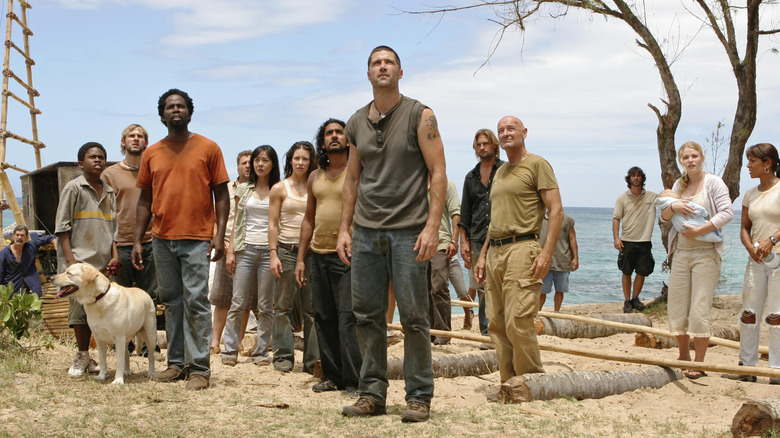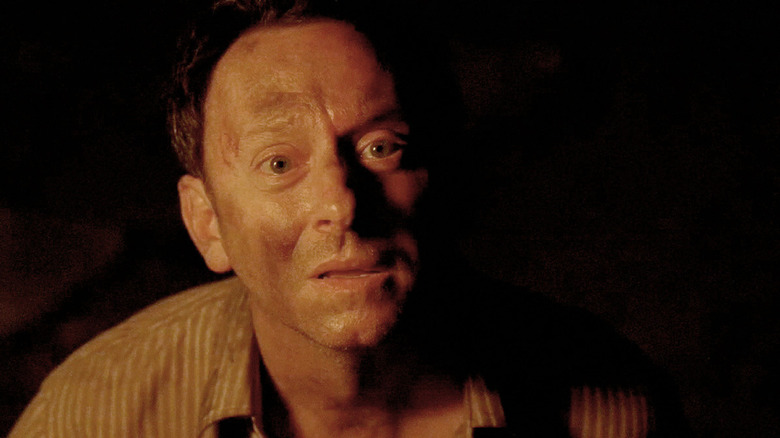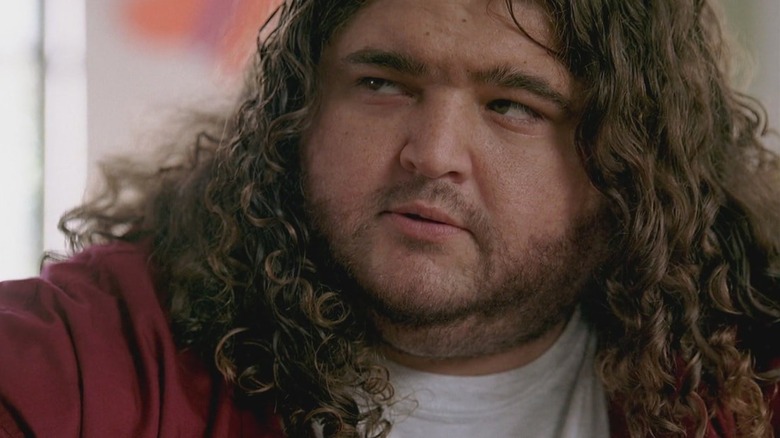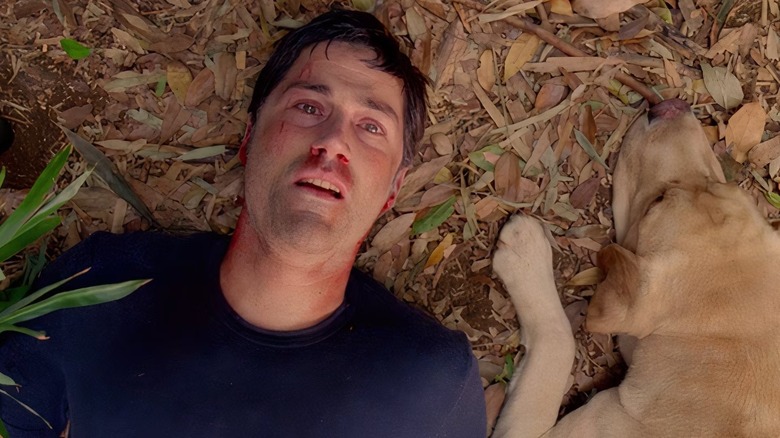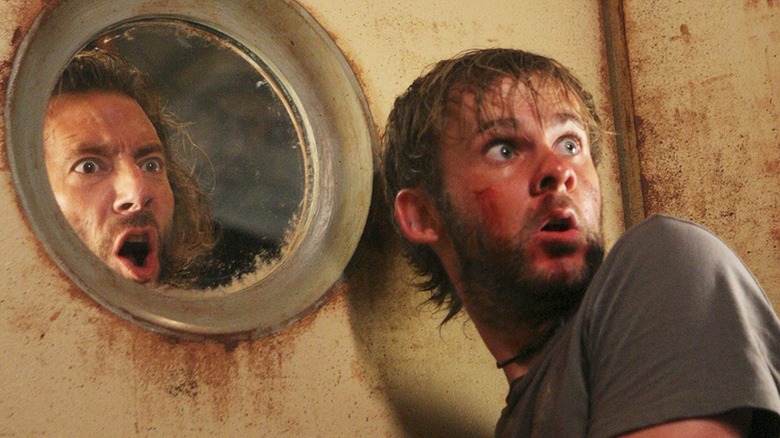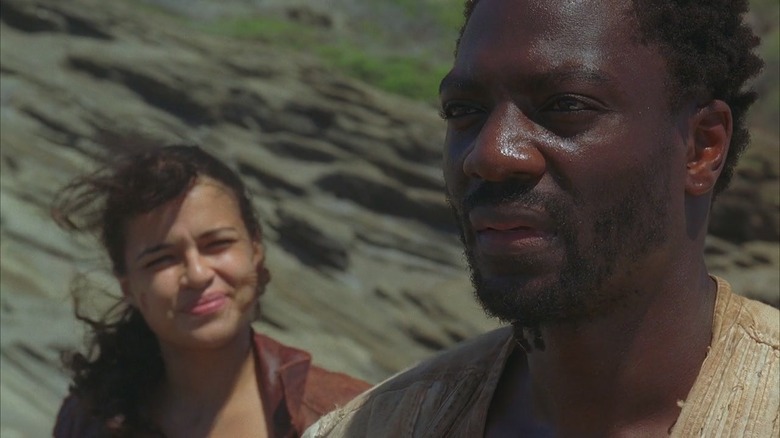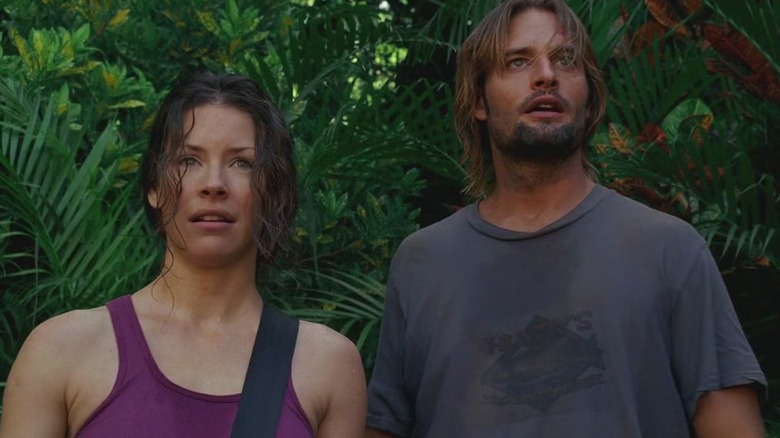Every Season Of Lost Ranked Worst To Best
For those who didn't experience "Lost" when it first aired on television, it is perhaps hard to explain just how big a deal it was. Before streaming really took off, and before an entire series would be dumped on an online platform in one go with the aim of being consumed as quickly as possible, audiences would be making an appointment each week to check in with their favorite show. "Lost" was a genuine watercooler series, full of unexpected moments and shocking twists. As the mystery unfurled each week, audiences were poised and ready to chat about their latest theories and ideas. And the brilliant thing was, you didn't always get the answers (or the answers you wanted, at least), which somehow made the lore even more fascinating.
"Lost" quickly became an obsession for many viewers, including the author of this article, a U.K. fan who woke up extra early to watch the final episode to make sure they didn't get spoiled. They were one of the people who passionately defended the divisive final episode as the perfect way to end the journey — but more on that later. And, like so many others, they spent hours reading online theories and essays about "Lost" in an attempt to decipher the true meaning of the show. Our expert writer's personal opinions will of course be a factor here, but we've also taken the general fan consensus and ratings on sites such as IMDb and Rotten Tomatoes into account to create this ranking. As is often said in the show, "We have to go back" to determine how each season of "Lost" stacks up today.
6. Season 5
There are no truly bad seasons of "Lost." However, there are seasons that are a little uneven, or ones that have comparatively weaker episodes that bring the season down overall. Season 5 is certainly uneven and is almost universally accepted among fans as the worst of the bunch. You can't fault its ambition, though, as it tackles not just flashbacks, flash-sideways, and flashforwards — all a big part of the "Lost" experience — but actual time travel.
After Benjamin Linus (Michael Emerson) turns the wheel to move the island, the Oceanic 815 survivors who remain on the island start to jump backwards and forwards in time. For the first time, the series veers away from the format of focusing on one character and showing a part of their backstory in flashbacks (though 14 of the 17 episodes in this season still have a featured character) and instead focuses on dual timelines. The season tracks two main timelines: One is predominantly in 1977 with the survivors who were left behind, and the other in 2007 when the Oceanic Six (the collective name given to the group who managed to leave) return to the island.
Season 5 isn't without merit, but the different timelines — and the group being split in space and time as a result — makes this feel like a bumpier ride than previous seasons. To find positives, though, "Lost" had been threatening to fully embrace the sci-fi side of its story since the beginning, and it finally went there with its fifth season. It took a big swing and there were some misses along the way, but it still sticks the landing with the two-part finale "The Incident."
5. Season 4
After the devastating Season 3 finale, we're introduced to some new characters who were onboard the freighter, but there are questions about their intentions. For the first time, we also experience flash-forwards, with glimpses of what happens to the likes of Hurley (Jorge Garcia), Jack (Matthew Fox), Kate (Evangeline Lilly), Sayid (Naveen Andrews), and Sun (Yunjin Kim) after they've left the island.
For many, Season 4 is where the wheels start to fall off the "Lost" wagon, but some of that was due to factors outside of its control: The 2007-2008 Writers Guild strikes impacted some of the most popular shows and movies, and that included "Lost." Eight of the 16 planned episodes had already been shot when the strike hit and, ultimately, two episodes had to be axed — though these lost episodes surfaced again in Season 5 and Season 6.
The strike proved to be a double-edged sword for Season 4 of "Lost." On one hand, the trimmed down season gave an injection of energy — things moved at a faster pace than perhaps they would've done and the story feels like it is being propelled forward in a satisfying way. On the other hand, it does feel a little rushed and haphazard in parts. The strike meant that Season 4 lacked some of the great character moments we'd come to know and love.
4. Season 6
When it begins, this season seems to be showing us the alternate universe where Oceanic 815 safely lands in L.A. and the island doesn't exist. This is "Lost," however, and there is a little more to it than that. Rather than an alternate universe, the flash-sideways are the collective conscience of the crash survivors so that they can all find each other again before they pass into the next world. Season 6 is undeniably a gear change from the time-hopping antics of Season 5 and it still leaves us with many, many questions. Perhaps one of the biggest things that went wrong with "Lost" was that it became overly convoluted, but what Season 6 does give us is an emotionally satisfying resolution for the characters we have come to know and love.
Enough time has passed that we now finally understand the ending of "Lost," but it split fans down the middle when it aired. Some felt it was a cheap tactic to even suggest "they were dead all along" — even though that is a fundamentally incorrect interpretation, and the finale goes to great lengths to spell that out. However, there were also plenty who thought it was a poetic and fitting end, placing particular emphasis on the impact of these characters on each other's lives. The flash-sideways timeline is the symbolic representation of the fact that these characters were meant to find each other, their paths were meant to cross, and their bond is so strong that they can only pass peacefully into the afterlife if they go together. It may not answer all the questions or tie up all the loose ends, but it is undeniably poignant and a fitting conclusion.
3. Season 3
We'll get the negatives out of the way up top: There are some absolute duds in this season, with "Stranger in a Strange Land" and "Exposé" among the worst episodes of the whole show. The thing is, they're each preceded by some of the very best episodes, with "Flashes Before Your Eyes" and "The Man from Tallahassee" demonstrating "Lost" at its finest, perfectly blending mystery and intrigue with genuine human emotion and drama. By the time you're in the thick of the final trio of episodes — with "Greatest Hits" acting as an aperitif before the main course double-header finale — "Lost" has rarely been better.
Season 3 also covers a lot of important ground in the "Lost" timeline, with our first real glimpse of the mysterious "Others," led by Ben Linus. Some answers are given — including why pregnant women are targeted by the Others — and we're left with even more questions when the mysterious "Jacob" is introduced. Crucially, this is the season when we start to see factions appearing in the core group, and the lines between the survivors and the Others start to blur. The divide between the "Man of Faith," John Locke (Terry O'Quinn), and the "Man of Science," Jack, starts to become more evident, and that is pivotal for what comes next.
There are some lulls in this season, sure, but all is forgiven by the back half. In fact, the second part of the season finale "Through the Looking Glass" is the joint highest-rated episode ever on IMDb (an honour it shares with Season 4, Episode 5, "The Constant").
2. Season 2
The first season of "Lost" ends with one of the all-time greatest cliffhangers, with Locke and Jack staring down into the hatch that had been the source of so much mystery. In Season 2, we finally learn what is inside the hatch. Viewers are introduced to Desmond Hume (Henry Ian Cusick) — arguably one of the best characters in the whole show — and learn about his peculiar job on the island.
Where Season 1 does a good job of introducing the characters, their backstories, and focusing on just surviving in this place, Season 2 opens the proverbial (and literal) lid on some of the island's biggest mysteries. We find out what the numbers mean and wrestle with the idea of whether we would also dutifully input them if we thought it was saving the world. We also learn that those who were originally perceived as being "Others" are in fact more survivors from Oceanic 815, and the fresh blood in the cast — including Michelle Rodriguez as Ana Lucia Cortez and Adewale Akinnuoye-Agbaje as Mr. Eko — are particularly welcome additions.
It is a big risk to keep introducing new characters, but the layers of mystery built into "Lost" means that it is able to successfully pull this off more than once. The introduction of the "Tailies" (the survivors of the tail-end of the plane) is perhaps the most effective example of this, and an excellent rug pull after leading us to believe they were hostile. Season 2 is "Lost" firing on all cylinders and it very rarely makes a misstep.
1. Season 1
There is a purity to "Lost" Season 1 that makes it endlessly rewatchable. Of course, it concludes in an open-ended fashion, so the other seasons are needed, but as a piece of television, the opening season of "Lost" is hard to beat. The sheer scale and chaos of the opening pair of episodes is unmatched, and it is in this season that you'll also find some of the best writing of the whole series, with episodes such as "Walkabout," "All the Best Cowboys Have Daddy Issues," and "Numbers" being some of the prime examples.
Before things got too complicated with flashforwards and flash-sideways, there was an easy-to-digest structure to the events on the island and the flashbacks that told us more about the characters. Yes, it was the endless mysteries, theories, and questions that kept us coming back for more, but it was the characters that got us hooked in the first place. In fact, some fans are so enamoured with the idea of the characters being the most important aspect of "Lost" that there's a way you can watch "Lost" chronologically, giving you all the backstory upfront before you dive into the mystery of the island.
Rewatching "Lost" today is an incredibly rewarding experience, and going back to Season 1 after you have seen everything else is a great reminder of what made everyone fall in love with it in the first place. What's more, there are so many things you only notice in "Lost" with multiple watches. Moments like Locke's explanation of backgammon in "Pilot: Part 2" ("Two players. Two sides. One is light. One is dark.") end up having huge significance much later on. Occasionally frustrating, always interesting, and very rarely boring, "Lost" is a truly unique show, and its first season may just be the best example of why we're still talking about it today.
